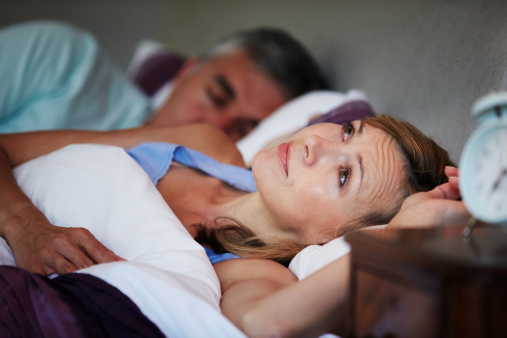 Last month, I had to complete a laborious, in-depth research report on the pathophysiology of bipolar disorder for a local publication.
Last month, I had to complete a laborious, in-depth research report on the pathophysiology of bipolar disorder for a local publication.
There were quite a few nights where I stayed up well past 3:00 a.m. to work on particular sections of the paper —I completed the report on time, but it had some “fatiguing” consequences on my psyche.
I’m a light sleeper to begin with, and going to bed late didn’t help. I felt more anxious and the slightest noise would jolt me awake from my sleep.
Regardless of when I went to bed, I had to get up at 6:30 a.m. the next morning; I certainly wasn’t well-rested during those mornings, and to be honest, I was probably more than a little grumpy!There is no question that sometimes we sacrifice much-needed sleep in order to complete something of importance, but at what cost? How much of an impact does sleep disturbance have on our bodies?
The Link between Disturbed Sleep and Cancer
In a study published early last year in the journal Cancer Research, researchers discovered that poor sleep quality can increase the aggressiveness of tumors, speed up cancer growth, and prevent the immune system from controlling or eliminating the onset of cancer. It is the first study to demonstrate the link between sleep disturbance and tumor growth in mice.Researchers from the University of Chicago and the University of Louisville observed mice in small groups. During the day, half the mice were forced to wake up and go back to sleep, while the other mice rested peacefully.After seven days, both groups of mice were injected with either one of two tumor types—3LLC or TC-1. After nine to 12 days, all the mice would develop tumors. Four weeks later, the researchers evaluated the tumors. What they found was remarkable!The group of mice with “disturbed sleep” patterns had tumors that were twice as large as the mice with “normal sleep” patterns. In a follow-up experiment, the researchers found that the mice with disturbed sleep patterns had more aggressive tumors when the tumor cells were embedded in the thigh muscle; in most scenarios, the thigh muscle will typically prevent tumor growth.
In this case, the researchers discovered that cells in the immune system—tumor-associated macrophages (TAMs)—played a factor in the experiment. TAMs will often influence the immune system’s response to cancer. Some TAMs, called M1, can kill tumor cells, while others, termed M2, will suppress immunity and promote tumor growth.
What was interesting was that the M1 TAMs were mostly found in the well-rested mice, while the mice with disturbed sleep patterns had the M2 TAMs. There were also higher levels of the toll-like receptor 4 (TLR4) in the mice with fragmented sleep patterns—high TLR4 levels indicate a correlation between tumor growth and disturbed sleep.
In a 2012 study published in the journal Breast Cancer Research and Treatment, researchers suggested that women who have fewer sleep hours may develop more aggressive breast cancer compared to women with longer sleep patterns. The study observed 412 post-menopausal breast cancer patients. They were tested with a tool used to predict cancer, called Oncotype DX. The patients also completed a survey to determine sleeping habits over a period of two years. There was a direct correlation between reduced sleep and higher scores on the Oncotype DX.
Signs You May Be Sleep Deprived
Sleep deprivation is also linked with an increased risk of diabetes, obesity, heart disease, stroke, hypertension, osteoporosis, anxiety, and depression. It can also reduce your memory, immunity, and libido.
Here are some key signs you might require more sleep:
- You wake up with an alarm clock each morning, and often rely on the snooze button
- In meetings, lectures, and warm rooms, you get fairly sleepy
- You sleep in on weekends on a regular basis
- You fall asleep while relaxing or watching TV
- You get sleepy when driving or after a heavy meal
How Much Sleep Do You Really Need?
Some experts claim that a minimum of six hours of sleep is only required. According to the National Institutes of Health, the average adult sleeps for less than seven hours a night. Are six to seven hours of sleep enough? You might be able to get by with six to seven hours; however, you will need more for optimal functioning. Most adults 18 and older will function best with seven-and-a-half to nine hours of sleep. Adolescents between 12 years old and 18 years old should average eight-and-a-half to 10 hours of shuteye.
What is the best way to understand how much sleep you need? Do a self-evaluation and assess how you feel throughout your day—from the instant you get up in the morning to the moment your head hits the pillow. If you are energetic and alert throughout your day, then you are likely getting enough sleep. If you find your eyes drooping by mid-day, then start going to bed a bit earlier. Your body will thank you for it.
See More :
Sources:
Hakim, F., et al., “Fragmented sleep accelerates tumor growth and progression through recruitment of tumor-associated macrophages and TLR4 signaling,” Cancer Research 2014; 74(5): 1329-1337.
“How Much Sleep Do You Need?” HelpGuide.org; http://www.helpguide.org/articles/sleep/how-much-sleep-do-you-need.htm, last accessed May 15, 2015.
Thompson, C.L., et al., “Association of sleep duration and breast cancer OncotypeDX recurrence score,” Breast Cancer Research and Treatment 2012; 134(3): 1291-1295.
Easton, J., “Fragmented sleep accelerates cancer growth,” The University of Chicago web site, January 27, 2014; http://news.uchicago.edu/article/2014/01/27/fragmented-sleep-accelerates-cancer-growth.
